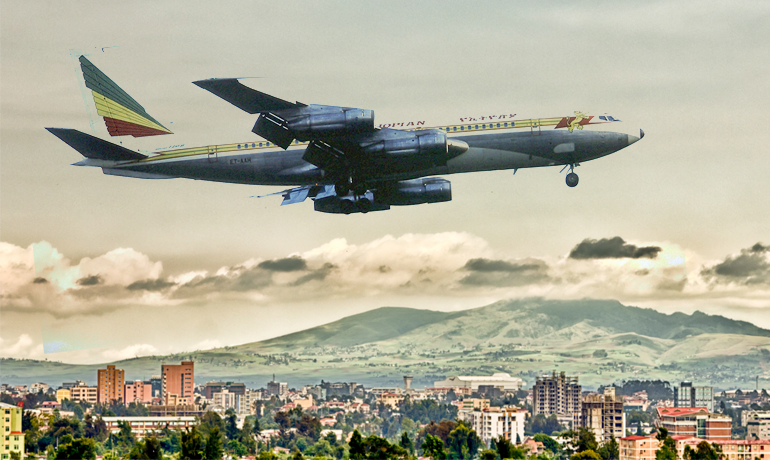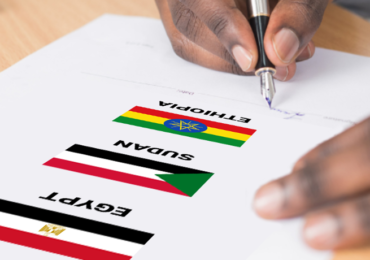Background
Ethiopian Airlines was established on December 30, 1945 by Emperor Haile Selassie with assistance from American owned company Trans World Airlines (TWA). This early beginning was a landmark step in the provision of commercial air transportation both on a national and international level because the rest of Africa (with the exception of Egypt Air which started in 1932) was still under colonial rule and did not commence air transportation services until after independence in the late 1950’s and early 1960’s. The other exception was the establishment of South African Airways which also started in 1932 but was operating under apartheid laws. Ethiopian Airlines’ round-trip journey from Addis Ababa to Asmara, and Cairo on April 8, 1946 using one of the five Douglas C-47 sky trains marked the start of the story of a remarkable organization that has earned the respect of its nationals and is also a state of the art, globally recognized, branded air transport carrier with 23 domestic and 130 international passenger and cargo destinations.
While European airports have seen the most expansion, the United States leads in the number of airports by country served by Ethiopian Airlines. Furthermore, over the past decade the growth in the number of passengers and the subsequent renovation of the Addis Ababa Bole International airport has turned Addis Ababa into a major travel hub creating vital connection points and transit destinations linking Africa with Europe, the Middle East, Asia and the Americas.
Ethiopian Airlines has set a great example of how a state owned entity can operate successfully in a free market economy when many African and international airlines have suffered losses and closures. Ethiopian Airlines has received multiple accolades including winning the continent’s best airlines award for four consecutive years, the most recent award being in 2021, from world airline evaluator SKYTRAX. The airlines’ dedicated cold storage equipment and ground handling logistics used for transporting vaccines and vital medical equipment during the Covid 19 pandemic has resulted in it receiving a first in Africa excellence award from the International Air Transport Association (IATA) which nominates qualifying candidates for accreditation in the Independent validators in Pharmaceutical Logistics (CEIV Pharma) certification process. In August 2021, Ethiopian Airlines, at the request of the US Transportation Command, assisted the United States with the evacuation of Afghan refugees from Doha, Qatar utilising Boeing 787-9 aircraft showing its innate ability to deliver humanitarian assistance in a time of crisis.
Boeing and The Ethiopian Airlines’ Partnership
Ethiopian Airlines’ history with American manufacturer Boeing, where both companies enjoyed a long-term partnership, was marked by a major turning point in 1962 with the arrival of a pair of Boeing 720 Bs making Ethiopian Airlines the first African airline to acquire US made commercial aircraft. In the 1970’s despite its socialist oriented economy, Ethiopian Airlines ordered the Boeing 727’s and fourteen years later it became the second airline in the world (after Israel’s EL AL) to order the Boeing 767. The arrival of this large aircraft heralded access to additional destinations as a result of the new long haul routes.
During the short time span between 1990 and 2000, Ethiopian Airlines became the leader in African aviation with an upgraded and modernized fleet. As travel became more accessible, and airlines looked for ways to cut costs, it became clear that airlines were committing to using dual engine aircrafts that were capable of completing extended ranges.
In 2012 Ethiopia received its first 787 Dreamliner jet. The Boeing 787 aircraft was engineered using the latest technologies and used less fuel to complete long range flights and was the first of its kind to be available in the market. This step gave Boeing an opportunity to carry out a successful test for the use of this luxury aircraft paving the way for Ethiopian Airlines to be the first African airline and the third airline in the world after All Nippon Airways (ANA) and Japan Airlines (JAL) to put these aircraft into operation.
As well as being a buyer of Boeing aircraft, Ethiopian Airlines’ engineers maintain and repair Boeing equipment. In 2009 this relationship expanded to include the establishment of a small aerospace manufacturing plant which produces wire harness kits for which the Ethiopian Airlines’ engineering team has received a silver and gold Boeing supplier award status. The mutual benefit of collaboration between Boeing and Ethiopia’s national carrier was sealed in a memorandum of understanding signed by the Ethiopian Airlines CEO Tewolde Gebremariam and Boeing’s top management as recently as August 2021. This agreement outlines plans to create a next generation, 21st century African aviation training and leadership center capable of serving Africa but also the Middle East and beyond. Furthermore, Ethiopian Airlines has made it clear about its willingness to collaborate with US owned aviation partners such as General Electric (GE), Pratt & Whitney, and Collins Aerospace. It should also be noted that Ethiopian Airlines has stayed loyal to the Boeing brand despite the Boeing 737 MAX accident in 2019 and the airlines’ successful cargo business using the European made Airbus A500-900 series fleet.
Ethiopian Airlines’ Contributions to Africa
As a homegrown air carrier, Ethiopian Airlines is Africa’s fastest growing and largest airline with its highest frequency of flights occurring in four major cities in Nigeria. In total, Ethiopian Airlines flies to 39 African destinations with the top seat booking destinations being Nairobi, Entebbe, Johannesburg, Mombasa, Khartoum and Kinshasa. It represents all the best things of what an African carrier should look like with a reputable name and high level customer service, as well as extensive plans for growth and expansion. As part of its “Vision 2025” initiative, Ethiopian Airlines has invested in several African Airlines including owning 40 percent of the East African carrier ASKY, 49 percent in Malawi Air, and 49 percent in Mozambique Airlines (also known as Mozambique Ethiopian Airlines). Moreover, by joining forces with Industrial Development Corporation (IDC), Ethiopian Airlines has a 45 percent stake in Zambia’s national carrier that will utilize Ethiopian’s Bombardier Dash 8 fleet.
The African Growth and Opportunities Act (AGOA) – Features, Benefits and Problems
The AGOA legislation was introduced in May 2000 by George W. Bush’s administration to offer eligible sub-Saharan African countries duty-free access to US markets. From 2015 to 2018, the biggest gains for Ethiopian businesses were sales in non-traditional areas such as textiles and garments which rose to 200 million from 17 million and footwear jumped to 102 million from 19 million.
Overall, in the past twenty years the AGOA trade deal has enabled Ethiopia to export $722 million with three quarters of activity taking place in the past three years creating jobs for 200,000 factory workers who are mostly women. While it is evident that Ethiopia greatly benefits from AGOA, the United States’ bi-lateral trade agreement with Ethiopia in 2018 enabled it to export almost $2.8 billion of goods (with 55 percent of the products attributed to aircraft, turbojets, propellers and helicopter parts) while Ethiopian exports to the US were a mere $247 million.
On January 1, 2022 President Joe Biden’s administration removed Ethiopia (along with Mali and Guinea) from The African Growth and Opportunity Act (AGOA) citing violation of human rights. While gross human rights violations were being committed during the years of 2000 to 2018, the United States government chose to ignore the violations and never imposed any sanctions. Their actions in 2022 to remove Ethiopia, a country with a democratically elected government where 40 million people voted, sends the wrong message to Ethiopia and the rest of the world. Not to mention the impact on the economy of the hundreds of thousands of workers whose jobs will be eliminated or impacted on both sides of the Atlantic Ocean.
The AGOA partnership demonstrates the significance of trade to both countries and the mutual benefits derived as a result of cooperation and trust between the United States, its large corporate and retail entities, their affiliates and for Ethiopia’s flagship air transportation carrier, an up-and-coming group of small to medium sized businesses and entrepreneurs, and a large section of the population seeking to secure employment and security in the workplace.
In Summary
The trade relationship between Ethiopia and the United States over the past twenty one years both from the perspective of AGOA and on a bi-lateral level has been mutually beneficial, with the United States benefiting more. It is clear Ethiopia’s removal will be more harmful to newly created and non-traditional markets that are creating employment for the average worker but also to long standing, stable and reputable transport and aviation industries like Ethiopian Airlines. In today’s globally linked and mutually dependent world it is not a good idea to take a partisan approach to politics and burn your bridges especially one that has been cultivated over one hundred years. Trade between Ethiopia and the United States should be a win-win and take into consideration the key role Ethiopian Airlines plays in connecting people and economies as well as the development of good relationships between Ethiopia, Africa and the rest of the world’s economy, travel, transport and tourism industry. The move to withdraw Ethiopia from AGOA at the beginning of this year is untimely and will have devastating consequences because the decision was made at a time when Ethiopia is trying to pull itself out of a war torn economy and rebuild destroyed infrastructure and tackle high unemployment.
It is not too late for President Biden and his administration to reconsider. There are several reasons for revisiting the decision to withdraw Ethiopia from AGOA: Ethiopian Airlines, Boeing and their affiliates have a long-term, and successful multi-dimensional partnership; the United States and Ethiopia share a one hundred years old diplomatic relationship between the two sovereign countries; keeping Ethiopia in AGOA would maintain the United States’ strategic position in Africa, notwithstanding the twenty one years of relations under the trade agreement.
Finally, two key democratic lawmakers, Senator Chris Van Hollen and Congresswoman Karen Bass have alerted the White House that the ban will hurt the nation’s most vulnerable and jeopardise the hard won economic gains. It would behove the current administration to revisit their move because a successful partnership and mutually beneficial collaboration is a terrific thing to waste.
References

Hannah Mariam Meherete-Selassie
Hannah Mariam Meherete-Selassie is a Professor of Communication, a strategic media consultant, and a published author. She holds a Masters degree in Communication from Bethel University in St. Paul, Minnesota and a BA (Hons) in Law/History from the University of Westminster and a diploma in Journalism from the School of Journalism in London, UK. The author can be reached at weaspire4[at]gmail.com



